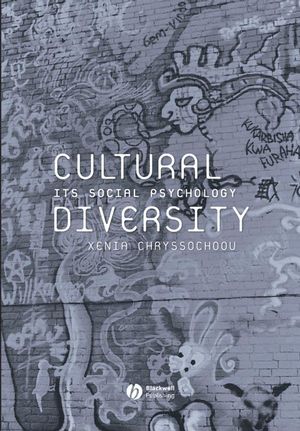Cultural Diversity: Its Social PsychologyISBN: 978-0-631-23122-6
Hardcover
248 pages
January 2004, Wiley-Blackwell
 This is a Print-on-Demand title. It will be printed specifically to fill your order. Please allow an additional 15-20 days delivery time. The book is not returnable.
Other Available Formats: Paperback
|
||||||
"Considering the increased multiculturalism of most societies
around the world, nothing could be more timely than this text that
discusses the latest social psychological thinking and research.
The book is a clear and scholarly work suitable for undergraduate
and graduate students unfamiliar with the field. In an accessible
and engaging style, Chryssochoou addresses the central issues and
debates, discusses in detail some of the key concepts and most
salient research, and offers an explanation of classic approaches
and theories. The breath of its coverage of the literature is
impressive and will help to stimulate further research in the field
and also provides the wider audience of social scientists with an
excellent introduction to what social psychology has to offer."
Dr Maykel Verkuyten, Utrecht University
"Far too many texts in social psychology spend so much time
outlining answers that they forget to explain why the questions
matter in the first place. Xenia Chryssochoou's great achievement
in this book is to make us care about the issues that our theories
are oriented to and hence make us want to engage with those issues.
She addresses what is perhaps the most pressing social issue of our
time: how can people live together in culturally diverse societies?
She uses this to address the contribution of a broad range of
social psychological theories. Her writing is scholarly and
balanced and clear. But perhaps most importantly, it is what we
sorely lack and urgently need: a passionate social psychology."
Professor Stephen Reicher, School of Psychology, St. Andrews
University
"The tendency to oversimplify cultural differences is a common
one, but Chryssochoou manages subtlety and theoretical
sophistication in addressing one of the defining issues of our
times: how to develop thriving multicultural communities. With
succinct summaries of the methods and results of groundbreaking
studies and cogent theoretical snapshots in panels and appendices,
Chryssochoou does student readers a great service. And by
considering immigration from the perspectives of immigrants
themselves as well as members of the receiving culture, she moves
all of us perceptibly closer to understanding the social and
psychological prerequisites for a better, more diverse societal
life." Dr John T. Jost, New York University and Stanford
University
"Until now, no attempts have been made to integrate the many
different research traditions that social psychologists use to
study cultural diversity. This situation is now changed. Xenia
Chryssochoou uses a method of triangulation to link, in a common
frame, studies on different aspects of acculturation such as the
reciprocal views of cultural minorities and majorities together
with processes described by main theories in social psychology. Her
book on Cultural Diversity: Its Social Psychology is unique
for its exhaustive treatment of the social psychological aspects of
the relationships between different cultural groups as well as for
the innovative devices used to structure and transmit the message."
Willem Doise, Professor of Social Psychology, University of
Geneva
"An excellent textbook introducing the central issues
surrounding the social psychological processes within multicultural
societies, with a particular emphasis on migration and ethnic
minorities. The perspectives of immigrants and hosts are both
examined, with case studies, theoretical snapshots and sidebar
definitions of key terms. Later chapters consider issues of living
together in a multicultural society and the future of the
nation-state within supranational groupings. A book that will
interest the general reader as well as the student of social
psychology." Scientific and Medical Network Review, Spring
2004
"The book aims to understand the principles of the interaction between the individual and the social in order to understand the functioning of our societies and the constitution of culture." Sage Race Relations Abstracts



